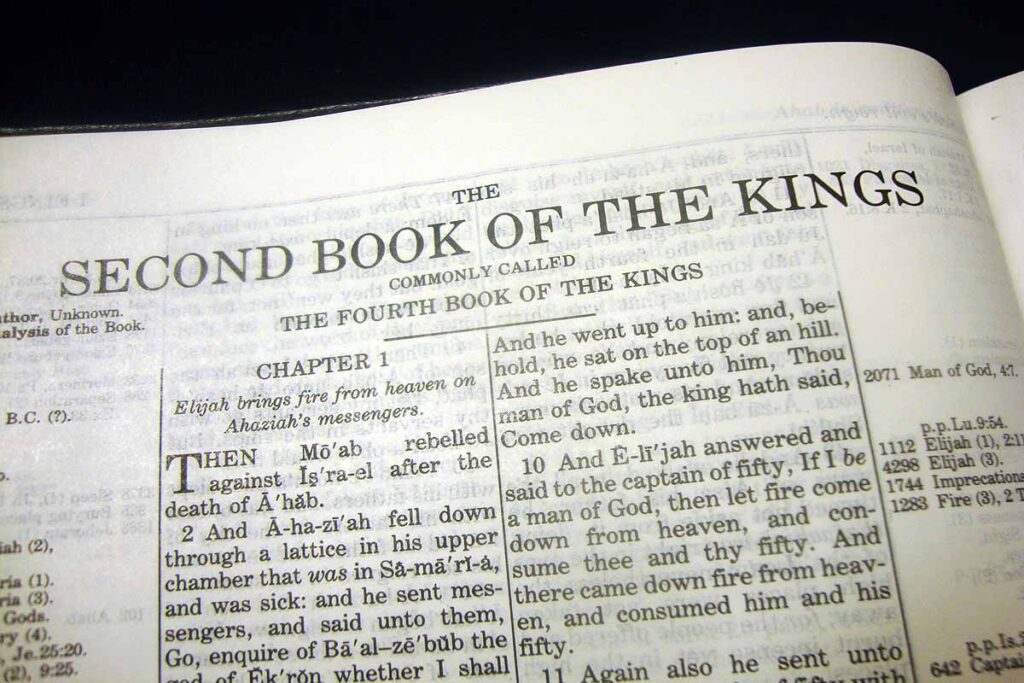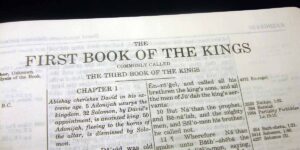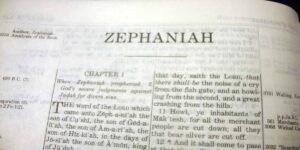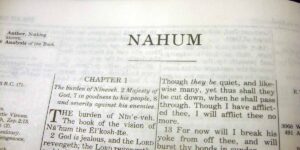The Book of Second Kings
In the book of Second Kings, we read of evil rulers, rampant idolatry, and a complacent populace – certainly pulling downward. Despite the pressure to conform, to turn from the Lord and to serve only self, a minority of chosen people moved the opposite direction, toward God. The Bethel prophets and others, as well as two righteous kings, spoke God’s word and stood for him. As you read Second Kings, watch these courageous individuals. Catch the strength and force of Elijah and Elisha and then the commitment of Hezekiah and Josiah, and determine to be one who swims against the current.
Second Kings continues the history of Israel, halfway between the death of David and the death of the nation. Israel had been divided, and the two kingdoms had begun to slide into idolatry and corruption toward collapse and captivity. Second Kings relates the sordid stories of the 12 kings of the northern kingdom (called Israel) and the 16 kings of the southern kingdom (called Judah). For 130 years, Israel endures the succession of evil rulers until they were conquered by Shalmaneser of Assyria and led into captivity in 722 B. C. Of all the kings in both the north and south, only two – Hezekiah and Josiah – were called good. Because of their obedience to God and the spiritual revivals during their reigns, Judah stood for an additional 136 years until falling to Nebuchadnezzar and the Babylonians in 586 B. C.
Although Israel had the witness and power of Elijah, the nation turned from God and was exiled to Assyria. Assyria filled the northern kingdom with people from other lands. There has been no return from this captivity – it was permanent. Such is the end of all who shut God out of their lives.
The northern kingdom was destroyed, and prophets were predicting the same fate for Judah. What more could cause the nation to repent? Hezekiah and Josiah were able to stem the tide of evil. They both repaired the temple and gathered the people for the Passover. Josiah eradicated idolatry from the land, but as soon as these goods kings were gone, the people returned again to living their own way instead of God’s way. Each individual must believe and live for God in his or her family, church, and nation.
Writer of Second Kings
The most probable position is that the prophet Jeremiah was the author of First Kings and Second Kings. Early Jewish tradition of the Talmud states that Jeremiah wrote Kings. This famous prophet preached in Jerusalem before and after its fall, and chapters 24 and 25 appear in Jeremiah 39-42; 53. The contents of all but the last appendix 25:27-30 could have been written by Jeremiah, and the final verses added by one of Jeremiah’s disciples.
Purpose of Second Kings
Contemplating the horror of the exile of God’s people, the author compiles First Kings and Second Kings to answer the looming question of why both the northern kingdom of Israel and the southern kingdom of Judah had been taken captive. He writes with a prophetic message, showing that this punishment by captivity to foreign pagan nations was the inevitable consequence of the persistent violation of God’s covenant with them. Kings was written to cause the exiles to reflect on their history and return to the Lord. Perhaps this prophetic perspective is one reason why it was included in the “earlier prophets” in the Hebrew Bible.
Historical Setting
The four centuries covered by First and Second Kings were times of change and political upheaval in the ancient work as the balance of power shifted. The Assyrian threat was particularly strong during the last 50 years of the northern kingdom. Under Tiglath-Pileser III, this conquering nation launched three devastating campaigns against Israel in 734, 733, and 732 B.C. The nation fell to Assyrian forces 10 years later in 722 B.C.
While Syria and Assyria were threats to Judah at various times, their worst enemy turned out to be the nation of Babylon. The Babylonians took captives and goods from Jerusalem in three campaigns – in 605 and 597 B.C. and in a two-year siege beginning in 588 B.C. in which Jerusalem finally fell in 587 B.C. The Temple was destroyed and thousands of Judah’s leading citizens were carried into captivity in Babylon.
Theological Contributions
The books of First and Second Kings present an interesting contrast between King David of Judah and King Jeroboam I, the first kings of the northern kingdom of Israel. Jeroboam established a legacy of idol worship by mixing false religion with worship of the one true God, and each succeeding king if Israel was measured against the standard of Jeroboams idolatry. But King David was used as a standard of righteousness and justice.
Special Consideration
The books of First and Second Kings describe several miracles wrought by God through the prophets Elijah and Elisha. In addition to proving God’s power, these miracles are also direct attacks on the pagan worship practices of the followers of Baal. Elijah’s encounter with the prophets of Baal on Mount Carmel, for example, was a test of the power of Baal. Baal was silent, but God responded as Elijah had predicted.
Recommended Bible Study Resources
ESV Study Bible – Study Bibles give you a deeper understanding of God’s Word with tools for life application like commentary, maps, charts, concordance, and study notes. Search our popular translations- NIV, ESV, NKJV, KJV and more!
Believer’s Bible Commentary: Second Edition – A Bible commentary is a written, systematic series of explanations and interpretations of Scripture. Commentaries often analyze or expound on individual books of the Bible, chapter by chapter and verse by verse. Some commentary works provide analysis of the whole of Scripture.
The New Strong’s Expanded Exhaustive Concordance of the Bible – The best concordance for word study! This exclusive new edition of a legendary classic puts generations of biblical research at your fingertips. A valuable tool for pastors, teachers, and students of the Bible.
Vine’s Complete Expository Dictionary of Old and New Testament Words – This classic word study resource allows you to study the meaning of biblical words in the original languages without spending years learning Greek or Hebrew. A great resource for students, seasoned pastors, and anyone who enjoys biblical word studies–even if they have little to no formal training in Hebrew or Greek.
Halley’s Bible Handbook – The beloved and classic Bible companion has been thoroughly updated, while retaining its time-honored features and Dr. Halley’s highly personal style, to offer even greater clarity, insight, and usefulness.
Click here to download or print the Bible outline “Second Kings – Turn From Your Evil Ways“.





